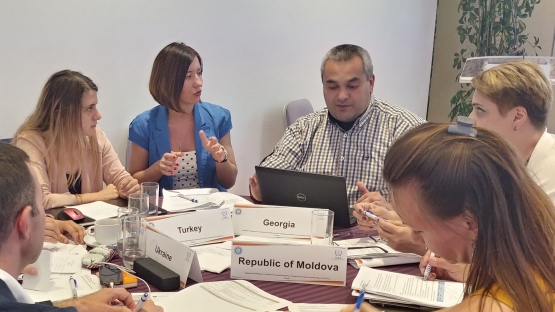Participants from 17 European countries shared ideas and good practices on the implementation of Integrated Nuclear Security Support Plans (INSSPs) while analyzing a mock nuclear security scenario during an IAEA workshop held last week.
The regional workshop, which aimed to strengthen the coordination of INSSP implementation in Europe, was held from 8 to 12 July in Bucharest, Romania. It piloted a format in which the 31 participants reflected on their national nuclear security regimes while discussing a fictitious nuclear security situation.
The countries that took part in the in the workshop were: Albania, Armenia, Bosnia and Herzegovina, Cyprus, Czech Republic, Estonia, Georgia, Latvia, Republic of Moldova, Montenegro, North Macedonia, Poland, Romania, Serbia, Slovakia, Turkey and Ukraine. More than two thirds of them have developed, or are in the process of developing, an INSSP together with the IAEA.
The INSSP provides States, upon request, with a systematic and comprehensive framework for reviewing their nuclear security regimes and identifying areas where they could be strengthened. The Plans also highlight any assistance needed to support the development of an effective and sustainable nuclear security regime, as outlined in the IAEA’s Nuclear Security Fundamentals publication. The IAEA regularly offers regional workshops on INSSP implementation, with the next one scheduled to be held in November 2019 in Dakar, Senegal.
In Bucharest, participants proposed and discussed novel ideas and concepts based on their real-world expertise as they deliberated on the mock scenario.
“The analysis of a fictitious case allowed us to absorb how the INSSP framework is used to prevent, detect, and respond to a nuclear security threat,” said workshop participant Angela Sidorencu, Senior Specialist in the Safeguards and Nonproliferation Department at the Republic of Moldova’s National Agency for Regulation of Nuclear and Radiological Activities. “Walking through the ever-escalating situation with my peers from other countries was very helpful in identifying whom to turn to for help, if needed.”
During the scenario-based discussion, participants identified common challenges within the region and activities, projects and strategies that could help address these needs.
“On a regional level, we don’t just share borders, we share similar challenges,” said Rodin Traicu, Chairman of the Romania’s Commission for Nuclear Activities Control, which hosted the workshop. “The INSSP process allows us to identify strengths and map out capabilities and gaps in the region, which will inform future activities.”
Such findings also help the IAEA adapt its nuclear security support to regional needs, said Juan Carlos Lentijo, Deputy Director General and Head of the IAEA’s Department of Nuclear Safety and Security.
“The country-specific INSSPs guide IAEA assistance in areas ranging from regulatory framework development to physical protection upgrades and the establishment of detection and response capabilities, as requested by the Member States,” Mr Lentijo said. “Countries that use the INSSPs have strengthened their national nuclear security capabilities, and these local resources could be used to help develop sustainable regional capabilities.”




